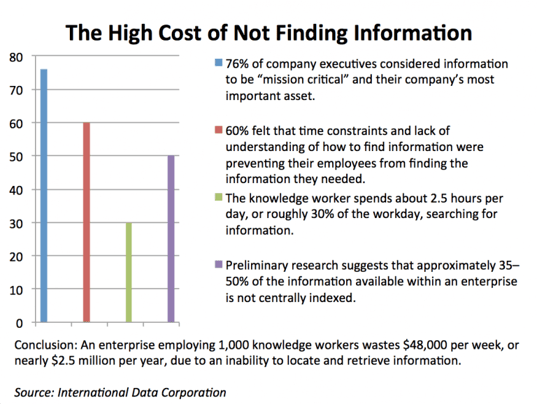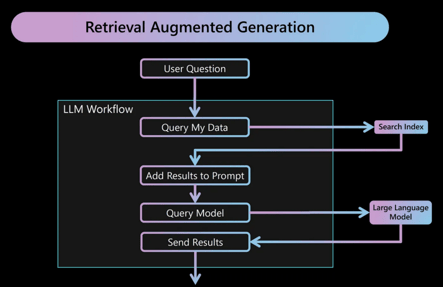AI SEARCH powered by GenAI: Maximising Workplace Efficiency

Introduction
In the bustling world of corporate dynamics, the struggle to navigate through a sea of information is a daily challenge. Startling statistics reveal that workers devote a staggering 2.5 hours each day to the quest for essential job-related information. Therefore, the need for a transformative solution is apparent. AI search engine powered by Generative AI is a game-changer that promises to declutter the corporate landscape.
In this blog, we’ll find out more about Generative AI for AI search and how it revolutionizes the way we find, utilize, and thrive on information in our workplace.
The information overload
Despite companies' efforts to enhance their information flow through advanced messaging and collaboration platforms, a pervasive surge in information volume has become the standard for the majority of the workforce. To delve into the costs, origins, and potential remedies of information overload, Gartner conducted a survey encompassing nearly 1000 employees and managers. The findings revealed that 38% of employees consider the volume of communications in their organization to be "excessive." Additionally, 27% of respondents expressed feeling somewhat overloaded by information.
This sense of overload translates into employees feeling overwhelmed by the plethora of information sources within the organization.
While it may be tempting to dismiss this as the inevitable consequence of operating in a knowledge economy, the tangible productivity costs associated with information overload cannot be ignored. This overload-induced energy drain could exacerbate existing issues with staff disengagement, including burnout, fatigue, and a lack of trust in leadership.

The cost of not finding information can be encapsulated by the following data:
- The modern knowledge worker invests approximately 2.5 hours each day, equating to roughly 30% of the workday, in the pursuit of information. – IDC
- Research reveals that, on average, professionals in both the U.K. and U.S. dedicate up to 25 minutes searching for a single document in over a third of their information searches. – SearchYourCloud
- Digital professionals, on average, allocate an estimated 28 percent of their workweek to searching through emails and nearly 20 percent in quest of internal information or identifying colleagues who can assist with specific tasks. – McKinsey & Company
Despite organizations diligently constructing infrastructures to facilitate easy access to information, the digital transformation initiatives aimed at enhancing workplace efficiency through increased information and data access seem to be inadvertently overwhelming the employees. While companies are investing in technologies that empower employees to work from any location and on multiple devices, the unintended consequence is a burgeoning volume of digital data.
The crucial element that's absent? A layer of intelligence poised to translate this wealth of information into actionable strategies.
Summary: The statistics on information overload are alarming, indicating a significant challenge for today's workforce. The tangible productivity costs associated with information overload underscore the need for a solution that not only provides access to information but also translates it into actionable strategies.
The Evolution of Workplace Search

The evolution of search technology mirrors the internet's progression, with early engines like Yahoo! and AltaVista paving the way. However, Google and Bing's arrival marked a revolution, introducing advanced algorithms that comprehend both keywords and query context.
Before modern search engines, tools like Lucene, Solr, and Elasticsearch were instrumental, providing features like text indexing and Boolean search in applications
Search technology continually evolves, transitioning from keyword-based to advanced semantic and vector methods. Artificial intelligence and machine learning play a pivotal role, enabling capabilities such as natural language understanding and real-time personalization.
Understanding AI Search:
For numerous years, traditional search algorithms have served as the fundamental framework for information retrieval. Beginning with rudimentary keyword-based approaches, these algorithms directly correlate query terms with terms existing in the data. Despite their efficacy in handling uncomplicated queries, keyword-based searches frequently prove inadequate in comprehending the context or semantics inherent in a query.

As we look toward the horizon, the landscape of search technologies is anything but static, be it Semantic, Vector or Hybrid search. Innovations are continually pushing the boundaries, offering more efficient, intuitive, and personalized search experiences. One of the most exciting advancements is the integration of generative AI models like GPT-4 into search functionalities. These models can understand context, generate human-like responses, making the search process more interactive and engaging. For instance, when a user searches for "Orange," the algorithm can discriminate between the telecommunications corporation and the fruit by analyzing the contextual cues surrounding the query. This stands in stark contrast to traditional search methods that would merely scan for the keyword "Orange" in the data, often yielding mixed or irrelevant results.
Summary: Traditional search algorithms, while effective for uncomplicated queries, are giving way to more dynamic and context-aware search technologies. The introduction of generative AI models like GPT-4 into search functionalities marks a significant leap forward, enabling a deeper understanding of user intent and context for more relevant and precise search results.
Navigating the Crossroads: Exploring Opportunities and Possibilities
- Advanced Search Functionality- Integrating genAI with enterprise search offers a substantial boost to search capabilities. Unlike traditional keyword-based searches, genAI understands user intent and context, enabling more insightful results. For example, a vague query like "sales growth strategies" could yield documents with relevant keywords, accompanied by generated summaries or insights for a more comprehensive and actionable search outcome.
- Natural Language Comprehension- Generative AI, particularly deep learning models, has made significant strides in natural language understanding. This progress allows the development of search systems that adeptly interpret and process natural language queries. Instead of rigid keyword matching, these systems grasp the nuances of user input, leading to more accurate and contextually relevant search results.
- Contextual Document Generation- GenAI aids in sifting through numerous documents in enterprise search by generating contextual summaries or entire documents based on user queries. For instance, a search for "project management best practices" could yield relevant documents along with a summary of key takeaways, enhancing efficiency in information retrieval.
- Personalized Content Recommendations- Generative AI excels at understanding user preferences and delivering personalized recommendations. Integration into enterprise search enables organizations to provide tailored content suggestions based on roles, interests, and past search behavior. This not only streamlines information discovery but also fosters continuous learning and knowledge sharing.
Deloitte's 2023 Global Human Capital Trends Report underscores the transformative impact of artificial intelligence and machine learning, projecting a substantial 37% surge in labour productivity by the year 2025.
Konverso presents its latest solution: AI SEARCH 
Konverso's AI Search redefines innovation at its core, elevating user experience and empowering impact-driven teams through a Generative AI-powered search functionality and comprehensive content recommendations. Our cutting-edge system ensures a seamless and efficient search process, delivering precise and relevant results in real-time.
Across various domains such as IT, HR, Finance, and Sales & Marketing, AI Search seamlessly employs Generative AI to extract both old and new information from your existing knowledge base and relevant data. It provides precise answers to your search queries, enhancing the efficiency and effectiveness of information retrieval.
Key highlights of our solution include:
- AI Search Excellence: Leveraging intelligent search strategies grounded in Natural Language Processing (NLP) and AI, our solution employs an NLP processing pipeline encompassing lemmatization, orthographic correction, and named entity recognition. Semantic embeddings and vectors are utilized to optimize search results, ensuring higher relevancy. The primary objective is to pinpoint the most pertinent content for a user's search query or intent.
- Generative AI Ingenuity: Our solution takes search results to the next level by providing a synthetic response generated based on the relevant content retrieved by the engine. This goes beyond a traditional approach of offering links to articles. This feature seamlessly integrates with the "classic" display of search results in the form of a list, offering a richer and more engaging user experience.
Benefits of AI Search in your workplace:
AI Search goes beyond conventional limits, boosting workplace productivity to three times its current capacity. This enables your employees to spend less time searching for information and more time initiating meaningful actions. It also helps in:
- Optimised document search: Streamline your document search with our optimized system. Our intelligent technology uses machine learning to prioritize results tailored to your unique context. Say goodbye to endless searches – find exactly what you need precisely when you need it. Benefit from enhanced search capabilities across various platforms like Google Drive, SharePoint, and JIRA.
- Access Management: Search engines exploits permissions defined on the content in the native content repositories. Konverso’s AI search seamlessly manage content access, allowing only designated individuals to view restricted information.
- Dynamic content filtering and navigation: Our search functionality intelligently adapts filters based on the query and relevant metadata, ensuring swift access to the most pertinent resources.
Conclusion
The intersection of generative AI and enterprise search holds immense potential for transforming the digital workplace. This fusion opens doors to elevate search capabilities, amplify information retrieval efficiency, and tailor content recommendations. Despite challenges, organizations embracing this symbiosis position themselves for a competitive advantage, cultivating an intelligent, productive, and efficient work environment. In the dynamic realm of technology, the integration of generative AI and enterprise search emerges as a synergistic force, redefining our interaction with information and propelling us toward unprecedented levels of productivity and innovation.



